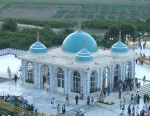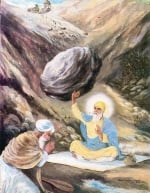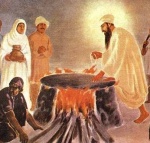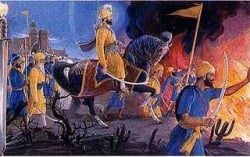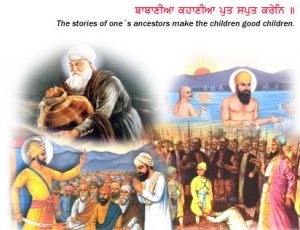Sakhi of the month
A Sakhi is a tale usually from the era during the times of the Gurus. However, many sakhis do exist from the period before and after the times of the Ten Gurus. Most Sakhis have a moral lesson and highlight important Sikh principles. Below is the list of important Sakhis with a message for Sikhs.
Sakhi of the month
Baba Wali Kandhari was a Sufi saint or pir who is believed to have been born in about 1476 in Kandahar in Afghanistan. In about 1498 he moved to Hasan Abdal near present-day Rawalpindi in Pakistan.
This town of Hasan Abdal is about fifty kilometres from Rawalpindi to the west side of the mountains. A very hilly area, in some places natural fountains or springs flow from the ground.
On a nearby hill, at an altitude of 714 meters, Wali Kandhari settled and built a small house near a natural fountain. The water here was very clear and so the town people used to come to fetch drinking water from this fountain. There was no other source of fresh drinking water nearby. The water from the fountain then progressed down the hill to the small town. Kandhari would preach to the simple people who came there. Soon he had enlarged his house into a small community building or "dera".
But as time progressed, he became arrogant and began to discriminate against those who had not accepted Islam. .....More
Hasan Abdal is a historical town in Northern Punjab, Pakistan. It is 40 km northwest of the centre of Rawalpindi just off the Rawalpindi-Peshwar road. It is famous for Gurdwara Sri Panja Sahib, one of the most sacred places of Sikhism. Thousands of Sikhs and Hindus visit the Gurdwara on the eve of Baisakhi every year.
On the nearby hill, at an altitude of 714 meters, there is a meditation chamber related to a 15th century Muslim Saint, Baba Wali Qandhari, popularly known as Baba Hasan Abdal. The saint stayed in Hasan Abdal from 1406-1516 AD but died and is buried in village Baba Wali near Qandhar also spelt as Kandahar (Afghanistan).
Guru Nanak with Bhai Mardana and a small party halted at this place at the foot of a hill. Under a shady cool tree, the Guru and Bhai Mardana started reciting Kirtan as was their normal practise. Slowly, the local devotees began to gather around the Guru. Soon, a large crowd of people began regularly to gather around the Guru. He talked to them about God and the true path of the holy. He told them the greatness of God and His creations. More and more people began to gather around him every day.
On the top of the nearby hill, Wali Qandhari had established a celebrated and popular dera (holy place) near a natural fountain. .....More
Hukam is a Gurmukhi word derived from the Persian "hukm", meaning command or order. Hukam refers to an important fundamental concept in Sikhi.
The adherents of this faith believe in the "Hukam of the Lord" - Guru Nanak, the founder Guru says, "How can one become pure?; how can the veil of illusion be torn away? O Nanak, walk in His Hukam; it is written in your destiny (1)" (SGGS p 1). So walk your life in his Hukam!
Now, what exactly does this word Hukam mean in our daily life?
In Sikhism, this Punjabi word literally means "divine will". A Sikh accepts that everything in the Universe happens according to the Will of an all powerful God, who is referred to as Waheguru. It is by the command of Waheguru that we are born and we die. Without His command ".... even a leaf on the tree would not move" is a common saying in Punjabi. .....More
On 16 June of every year since 1606, the Sikhs have commemorated the martyrdom of Guru Arjan, the fifth Sikh Guru and the first Sikh Martyr.
The story of the execution of the Sikh Guru, under the orders of the Mughal Emperor Jahangir has suffered at the hands of poets, street entertainers and historians alike; the reality of the facts has been lost.
In about a century after Guru Nanak, Sikhism turned from a small minuscule sect into a mass movement. Many thousands of dedicated adherents followed the teachings of the Sikh Gurus; even some prominent Muslims who enjoyed a privileged position in the Mughal state during this period embraced Sikhism. The Gurus ideology was gaining great momentum.
The Mughal rulers found it difficult to tolerate the growth of Sikhism and its ever-increasing popularity. The reaction of the orthodox Muslims is found in the memoirs of Emperor Jahangir, the Tuzuk-i- Jahangiri. The main reasons for the execution of the Guru can be listed under three headings- Religious, Personal and Political. .....More
Featured Sakhis
Raja Hari Chand was one of the twenty two hill chiefs who once boasted that if he ever came face-to-face with Guru Gobind Singh Ji on the battle field his one arrow would be enough to kill him. It so happened that when some of the hill chieftains turned against Guru Sahib Ji and sided with the Mughal forces that Raja Hari Chand found himself face-to-face with Guru Sahib Ji on the battlefield.
In the raging battle Guru Sahib Ji shouted out to him "Hari Chand, here I am. Strike me if you can, you may feel sorry afterwards that Gobind Singh did not give me a chance to test my prowess in archery." Upon this, Hari Chand drew his arrow hard and shot it at Guru Sahib Ji with all his might. .....More

by Guru Arjan
A cousin of Guru Ram Das came to Amritsar from Lahore especially to ask Guru Sahib to attend his son's wedding. Guru ji said, "I will not be able to go because I can't leave my duties here as Guru. Perhaps I can send one of my sons instead."
Guru Ram Das ji had three sons: Baba Prithi Chand or Prithia, Baba Mahadev and Arjan Mal. Prithia was in charge of collecting donations, of which he secretly took a portion for himself. When the Guru asked him to attend the wedding, Prithia said, "I have to take care of the collections. And I hate going to weddings."
Actually, he was afraid if he were away from the Guru for too long, he might not be appointed the Guru's successor. Having no luck with Prithia, Guru Ji then turned to Mahadev. Mahadev lived his life in meditation and said, "I have no desire to involve myself in worldly affairs."
Finally, Guru Sahib asked Arjan if he would go. Arjan said, "I only desire to do what you wish." Guru ji was very pleased. He asked Arjan to spend some time in Lahore to share the Guru's teachings with the Sikhs there. Any donations he received were to be given to the free kitchen to feed the poor. The last words he said to Arjan were, "You should stay in Lahore until I send for you by letter." .....More
| Sakhi about the "Two Hungry Mice" | |
| One day, a man was walking along the dusty footpath deep in thought. Suddenly, he fell into a well!! It was quite a deep well but it had no water inside it. However, there was no way out of the well! The man thought to himself "How am I going to get myself out of here?"..... → read more | |
Other Sakhis
External Links
- Sau Sakhi
- Miracles and True Happenings
- www.sikh-history.com
- www.sikhpoint.com
- Sakhis at Daughters of the Khalsa
- sikhspeak.com
- Tuhi Tu - Sikh Sakhis
- Sikh Sakhis
- Sakhis Related to Guru Arjan Dev ji
Modern Stories
